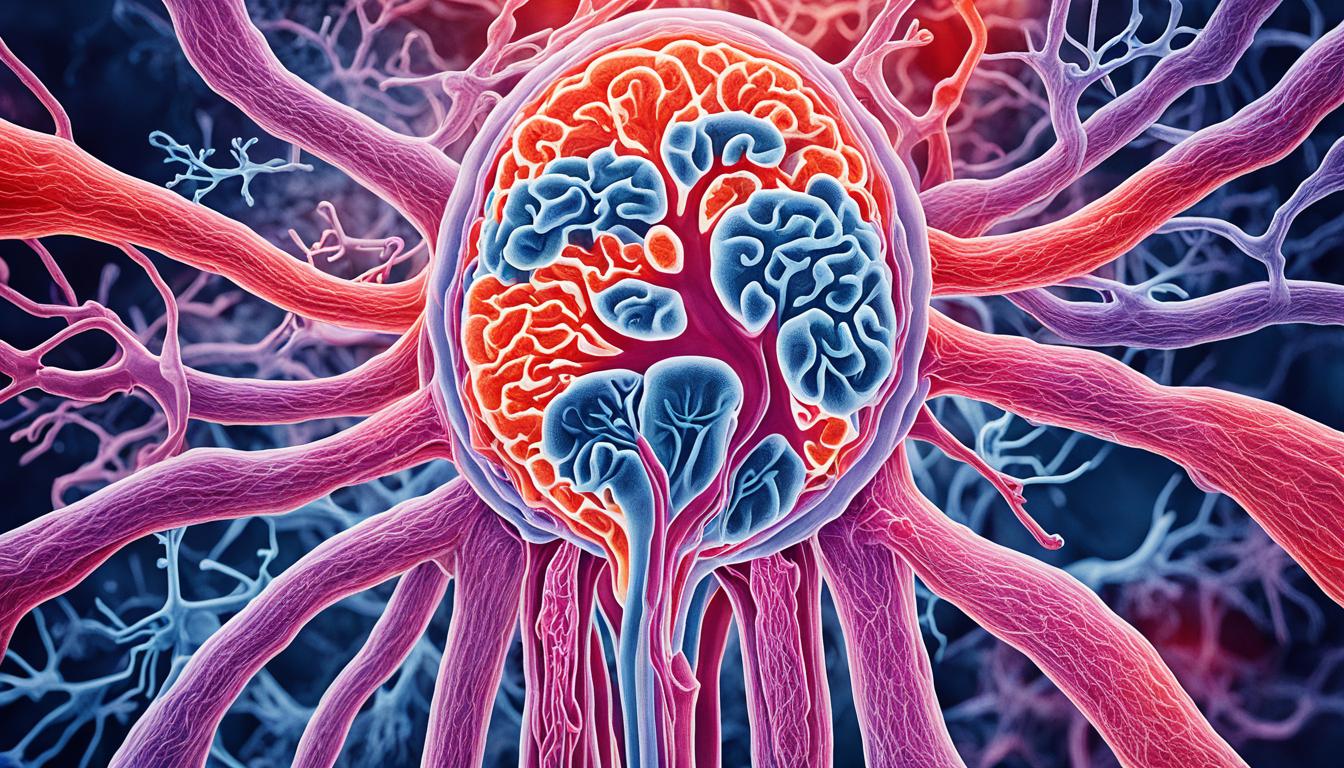Wegener’s granulomatosis, or GPA, is a rare autoimmune illness. It leads to blood vessel swelling. It mainly affects the ears, nose, and sinuses. But, it can also harm the kidneys and lungs.
People with this disease often have a runny nose, cough, and joint pain. They may also feel hoarse, get ear infections, and experience skin changes. If not treated, it can cause serious problems in these areas.
Doctors often treat Wegener’s granulomatosis with drugs. These can include corticosteroids and immune suppressants. More recently, stem cell therapy has shown promise as a treatment.
Key Takeaways:
- Wegener’s granulomatosis is a rare autoimmune disease that causes inflammation of blood vessels.
- Symptoms can include chronic runny nose, cough, joint pain, and skin changes.
- Early diagnosis and treatment are crucial for successful recovery.
- The exact cause of Wegener’s granulomatosis is unknown, but it involves an abnormal immune system reaction triggered by inflammation.
- Treatment options include corticosteroids, immune suppressants, biologic medications, and stem cell therapy.
Causes and Diagnosis of Wegener’s Granulomatosis
Wegener’s granulomatosis is a rare disease where the immune system attacks certain tissues. Its exact cause is still a mystery. Yet, it starts with inflammation, which is the body’s response to something wrong. This disease is not something you can catch from someone else.
A few people might get it after an infection, but we’re not sure. It mainly strikes those between 40 to 65, especially if they come from northern Europe. All ages can get it, though.
Being able to spot Wegener’s granulomatosis early is key. Look out for things like a long running nose, cough, or sore throat. Joint pain, ear issues, and skin problems can also pop up. If any of this feels ongoing, see a doctor right away.
To diagnose this disease, doctors run different tests. They look for certain proteins in your blood, like ANCA. A urine test looks for kidney problems, which can be a sign of this disease.
Imaging like X-rays helps doctors see inside your chest. Sometimes, you might need a biopsy. This means a small piece of tissue is taken to check under a microscope.
Spotting Wegener’s granulomatosis early and testing for it accurately are vital. If you think you might have it, don’t wait. Getting checked by a doctor as soon as possible is the best move.
| Tests for Diagnosis of Wegener’s Granulomatosis | Purpose |
|---|---|
| Blood tests | To detect ANCA and other proteins associated with the disease |
| Urinalysis | To check for kidney involvement and detect abnormalities |
| Imaging tests (chest X-rays, CT scans) | To visualize the respiratory system and identify abnormalities |
| Biopsy | To confirm the presence of vasculitis or granulomas |
Seeing a specialist is very important if you might have this disease. They’ll use test results, your symptoms, and health history to figure out the best care for you.
Treatment Options for Wegener’s Granulomatosis
Treating Wegener’s granulomatosis is about reaching remission and controlling symptoms. The main treatments are corticosteroids, immune suppressants, and biologic drugs.
Corticosteroids like prednisone are given to lessen swelling and help with symptoms. They lower the immune system’s actions, which eases inflammation in the body.
Inhibitors of the immune system, including methotrexate, are also part of treatment. They target the immune system’s missteps, cutting down on vessel inflammation.
Biologics are key in treating Wegener’s. They aim at specific immune molecules, helping more directly and successfully. They have been very beneficial in improving life quality for patients.
Sometimes, these treatments might lead to side effects. Corticosteroids can cause weight gain and blood pressure issues. Immune suppressants might make infections more likely. Biologics could also raise the risk for some infections. Careful monitoring and cooperation with doctors are crucial to handling these issues.
If the illness is severe or very advanced, other treatments might be needed. These can be new drugs or methods, like special blood filterings, to further calm the immune system. They are for those who don’t get better with usual treatments or have serious problems.
After the first treatment, ongoing care is often needed. This could be taking small doses of certain drugs for up to 2 years. The goal is to keep the disease quiet and avoid sudden disease returns.
Solid teamwork between patients and their medical team is very important in managing Wegener’s granulomatosis. Regular check-ups and talks about how you’re feeling can help keep treatment on the right track.
Conclusion
Wegener’s granulomatosis is a serious autoimmune disease. It leads to ongoing inflammation in the body’s blood vessels. Getting an early diagnosis and starting treatment quickly is crucial. This helps prevent damage to organs and makes chances for a good outcome better.
There are various ways to treat this condition. Doctors may use corticosteroids, immune suppressants, or biologic medications. Recently, stem cell therapy has shown promise. It gives hope for a new and effective way to manage Wegener’s granulomatosis.
Medical science keeps advancing. This means there is hope for those with this illness. It’s important that healthcare workers and researchers keep striving to find better treatments. Their work is essential for offering lasting relief to people affected by this rare disease.

